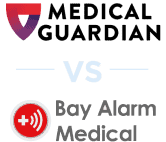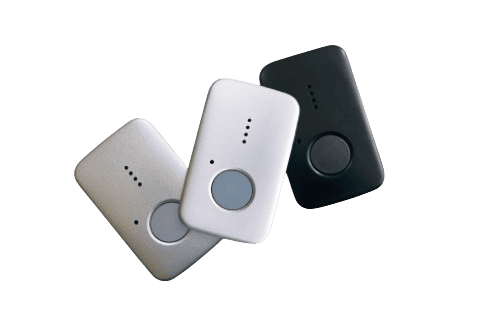
MGMini Medical Alert Review, Tested by Caregivers


Medical alert systems are infamous for clunky, large wearables. And, in my experience, many users are unwilling to wear them — making the devices useless. However, in recent years, many companies have introduced medical alert systems with more streamlined and discreet designs.
Roughly two inches tall and one inch wide, the MGMini is one of the smallest devices that we’ve tested. Despite its small size, this mobile medical alert packs in a speakerphone, help button, 4G cellular connection, and fall detection. If your loved one has been put off by larger and more cumbersome devices, then the MGMini might be a match.
For the past week, I have used the MGMini both inside and outside my home; it excelled in most areas. Its response times were fast, its GPS was accurate, and its caregiver app was among the more advanced on the market. Provided fall detection is not your top priority (more on that below), the MGMini is a great option for a mobile medical alert system.
FYI: The MGMini performed well, but it’s far from the most affordable medical alert system. To find devices from $25 per month, read our guide to the best medical alert systems.
MGMini Pros and Cons

MGMini Pros
- Fast response time: Averaging eight seconds in my 10 test calls, the MGMini lives up to Medical Guardian’s lightning-fast response times.
- Caregiver connectivity: The MyGuardian app allows loved ones to track my device’s location and be notified when I make emergency calls.
- Water-resistant: The MGMini is water-resistant, meaning you can wear it in the shower without damaging it.
- Four-day battery life: The MGMini lasted for four days before I needed to recharge it. This is pretty long for a mobile medical alert system.
MGMini Cons
- Poor fall detection: Of my 10 test falls, the MGMini detected only one. For a more reliable fall detection device, read my guide to the best fall detection devices.
- Higher costs: The MGMini itself costs a one-time fee of $149.95, followed by monthly charges of $39.95 ($49.95 with fall detection). For more affordable options, read my rundown of the most affordable medical alert systems.
MGMini Specs
| Size | 2.15 x 1.3 x 0.57 inches |
| Weight | 1.28 ounces |
| Average Response Time | 8 seconds |
| Battery Life | 4 days |
| Water-Resistance | IP67 (water-resistant) |
| Cellular Signal | 4G LTE |
| Starting Monthly Price | $39.95 |
MGMini vs. MGMini Lite
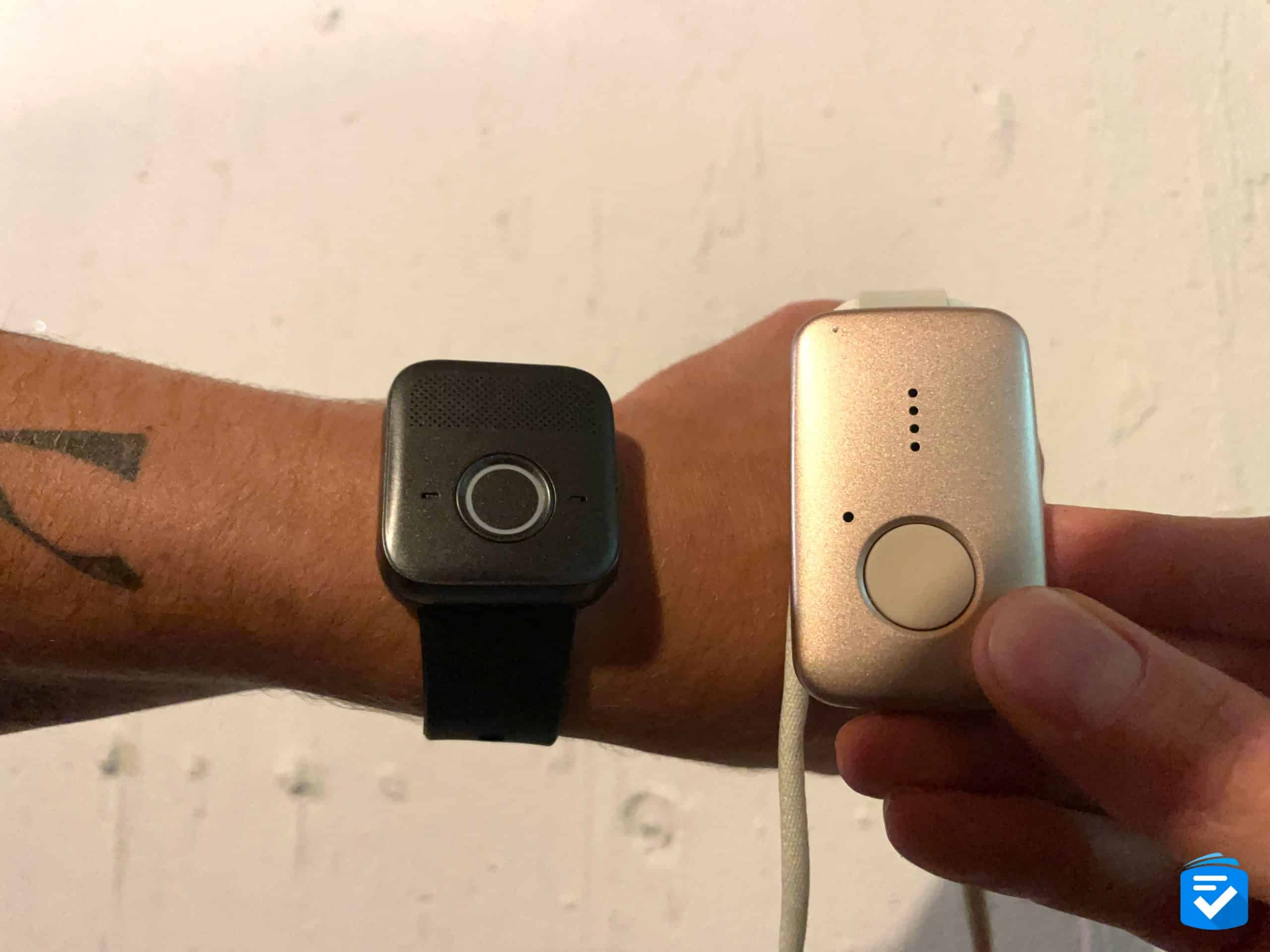
If you’re pursuing the Medical Guardian website, you may have noticed a similar device to the MGMini: the MGMini Lite. This is essentially a bracelet version of the MGMini pendant. It costs the same for the equipment ($149.95), but the monthly costs are a bit higher with the MGMini Lite: $46.95 versus $39.95.
Both mobile systems use the same app and have the same fast response times. However, in my tests, I noticed one major difference: The MGMini Lite had much more accurate fall detection. It detected eight out of my 10 test falls; the MGMini only detected one.
I recommend the MGMini Lite if you’d rather wear a medical alert bracelet or if fall detection is a desired feature. Otherwise, go with the MGMini to save a few bucks each month. To learn more, read my MGMini Lite review.
MGMini Video Review
Want to see me placing a series of test calls with the MGMini? Then watch our full video review.
My Experience With the MGMini
Unboxing
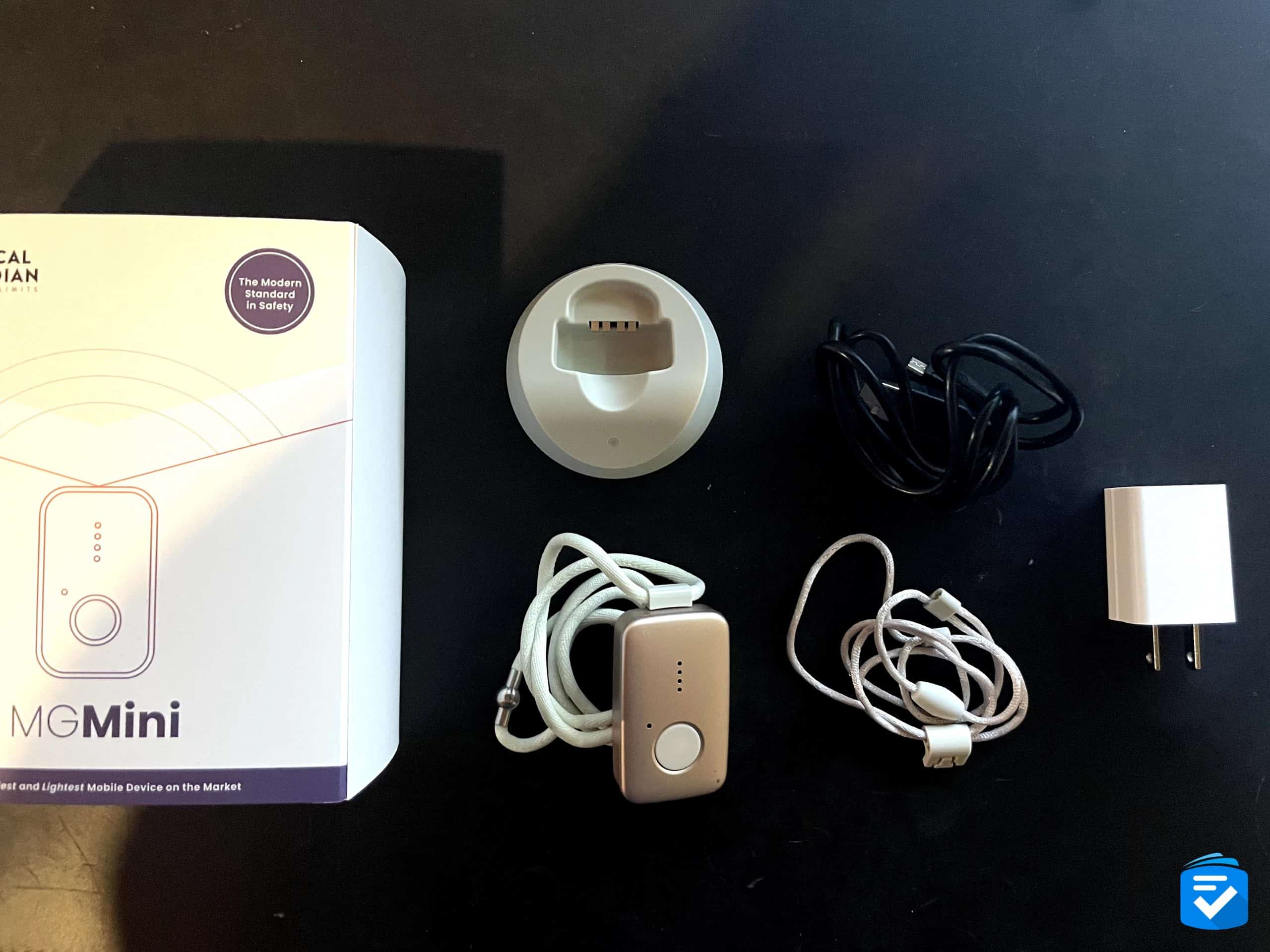
My MGMini purchase included the following:
- 1 MGMini device
- 1 nonadjustable lanyard
- 1 belt clip
- 1 adjustable lanyard
- 1 charging cradle
- 1 charging brick
- 1 USB charging cable
Activation
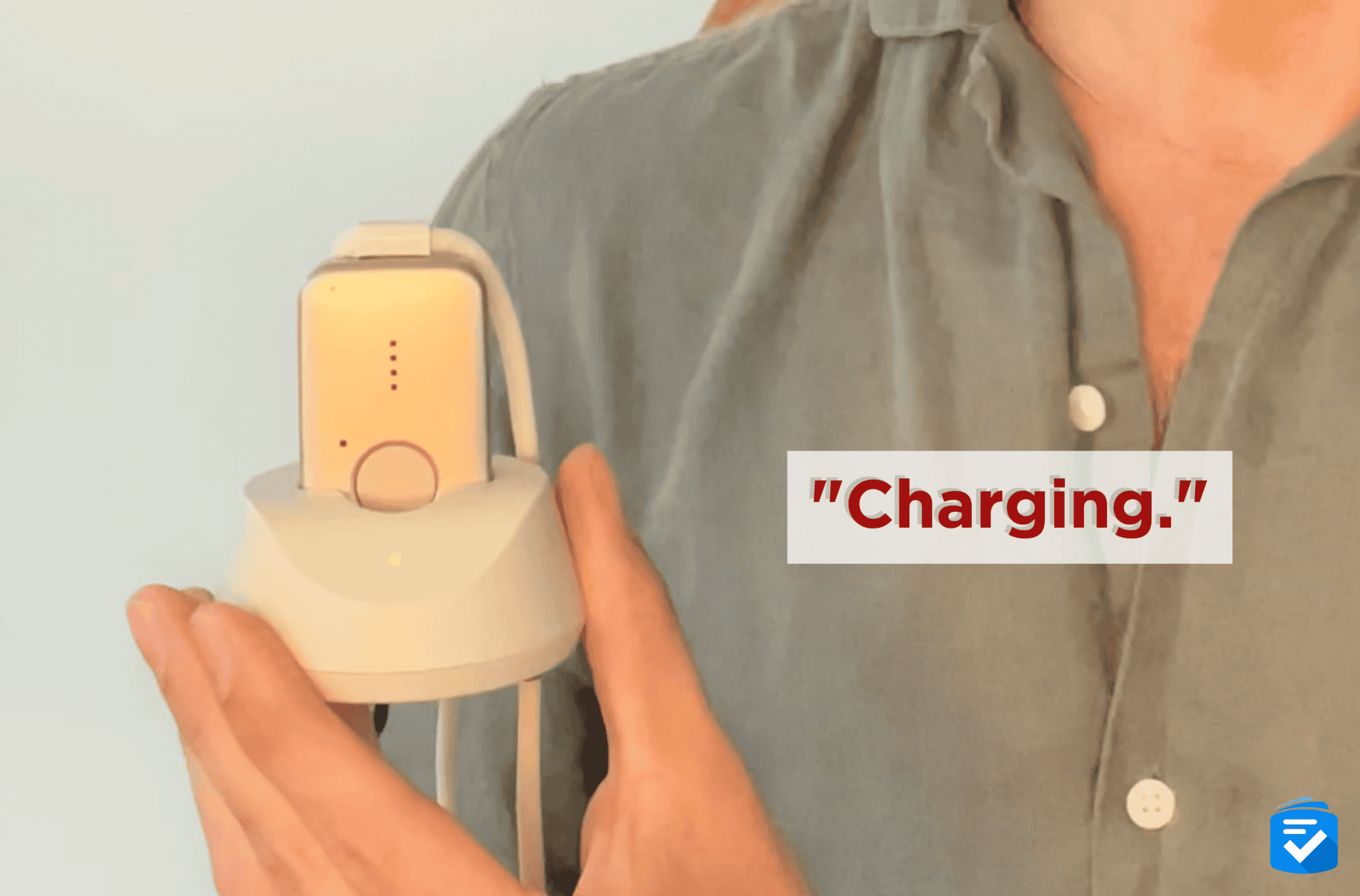
To get started, I plugged one end of my USB wire into the charging brick and the other into the charging cradle, then plugged it into my wall. The charging cradle displayed a green light, and I put the MGMini on my charger with the help button facing toward me. The device said it was powering on and then charging. Once the LED light turned from red to green — about four hours later — it was fully charged and said, “Device ready.”
The good news is that there wasn’t an activation fee on top of what I already paid for the equipment and subscription. This is a win over the Lively Mobile2, which charges an activation fee of $35 (although you can save $10 by ordering online). No activation fees are fine by me, as I paid enough money upfront for the MGMini.
Performance
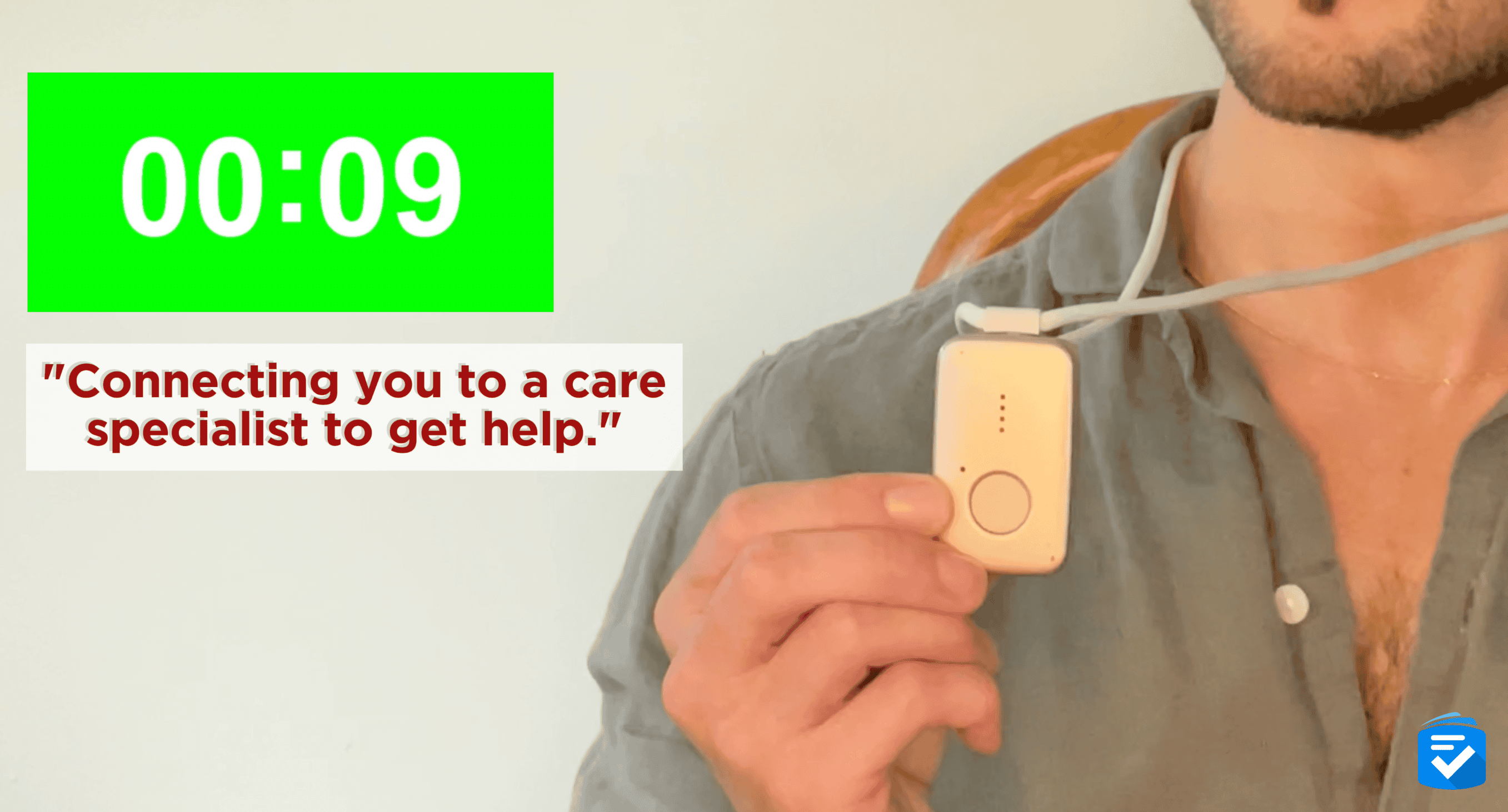
Once the device was ready, I decided to test it to make sure it was working correctly. To test it, I pressed the side button twice; it then told me to press the help button to get to the test center. I pressed the help button for two seconds, and it asked me to say my name — testing the microphone. The test went smoothly, and the device told me it was complete. With a loud speaker and easy voice activation, the MGMini is one of the best medical alert systems for users with hearing loss.

It was nice to know that my medical alert system was working — both when I was doing tasks around the house and when I was out running errands. This gave me peace of mind that no matter where I was, I’d be safe if I remembered to wear my MGMini; this was the case even in the shower, as the device is water-resistant. Because the device is so light, I often forgot I was wearing it.

In my 10 test falls with the MGMini, it detected zero slow falls and one fast fall. This was disappointing, seeing as every other feature of the device worked well. So, if fall detection is an important feature for you, I’d recommend the MGMini Lite.
MyMedicalGuardian App
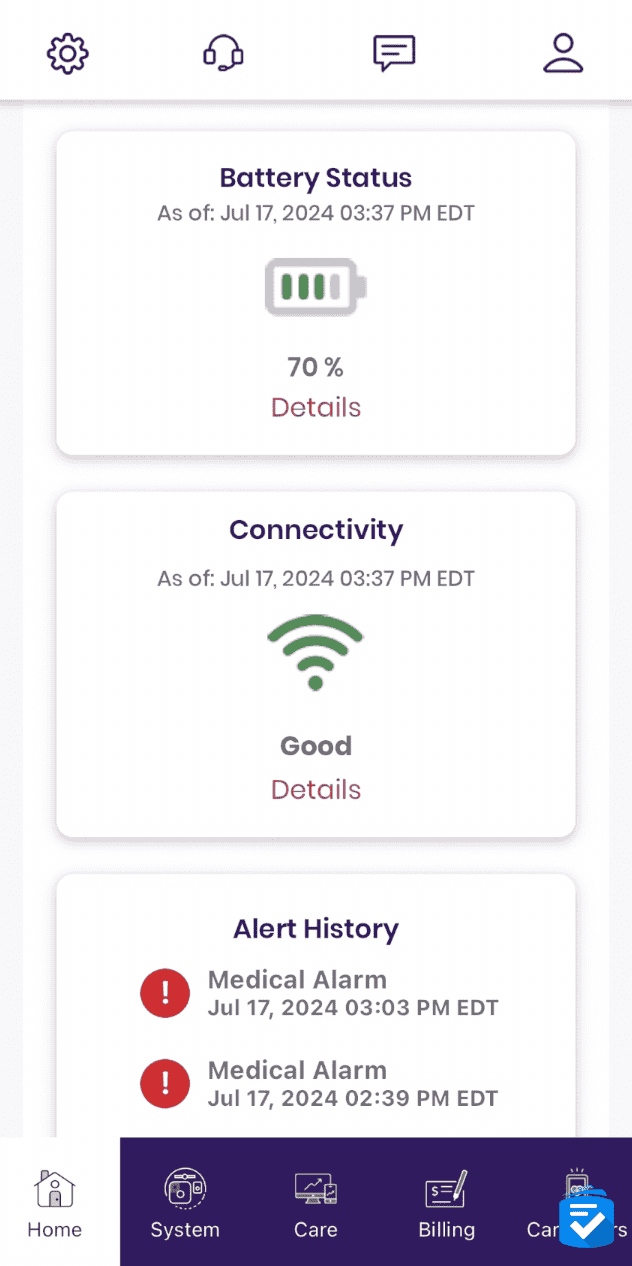
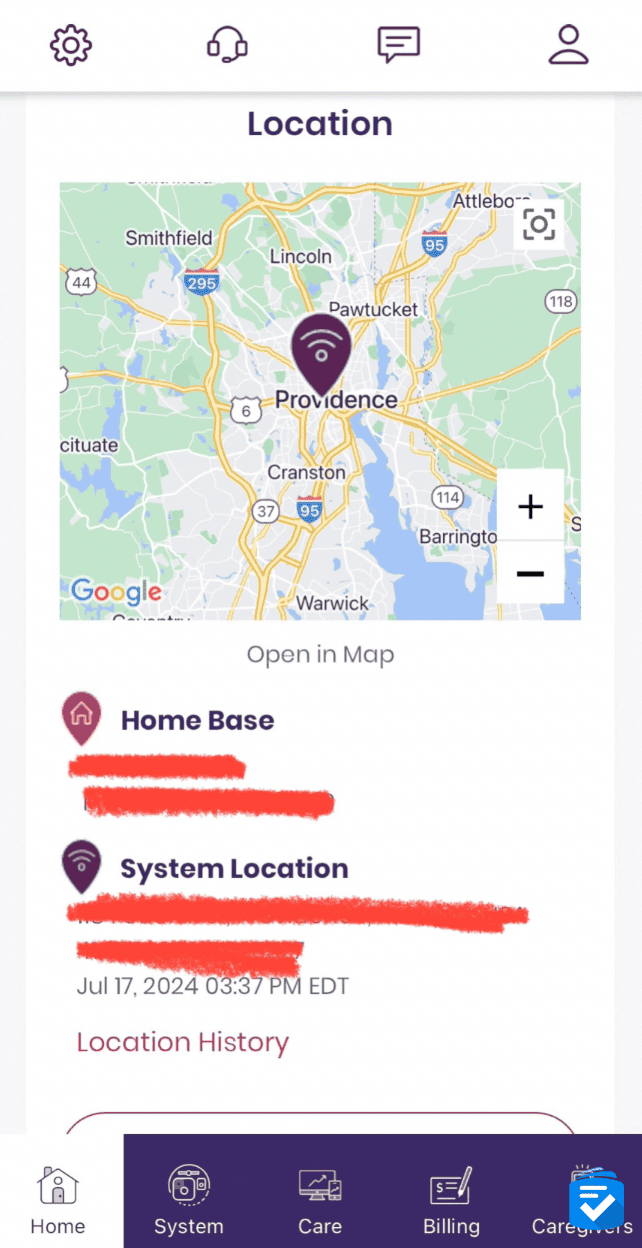
As with other Medical Guardian systems, the MGMini includes access to the MyGuardian portal. Through MyGuardian — available via an internet browser or smartphone app — loved ones can remotely monitor the device.
This meant, from his smartphone, my partner could track my location and check the battery life of my device. He could also ensure that it had adequate cellular signal and check on my alert history. The one noteworthy omission here is push notifications.
While the MyGuardian portal allows you to view a history of emergency calls, it will not automatically notify loved ones precisely when the call is made. For this feature (Medical Guardian’s OnGuard Alerts) to be activated, you’ll have to pay an extra $2.99 per month. Once enabled, loved ones will receive text messages when the MGMini places an emergency call. While I appreciate this feature, I did not appreciate the extra charge — especially when companies like Lively and Bay Alarm Medical include it for free.
MGMini Pricing
The MGMini costs a one-time $149.95 payment for the device, followed by monthly payments of $39.95. Fall detection costs an extra $10 per month (not that I’d recommend it here), and OnGuard text alerts cost an extra $2.99 per month.
Overall, these prices are a bit higher than average, as is the case with Medical Guardian’s other systems. Additionally, while Medical Guardian does not require long-term contracts, the company offers no free trial period. When I canceled my service, I only received a pro-rated refund for my monthly $39.95. The $149.95 device cost is nonrefundable.
For a more affordable mobile device that comes with a 30-day trial period, I’d recommend checking out our Bay Alarm Medical review. To learn more about Medical Guardian’s pricing and refund policy, read my full guide to Medical Guardian costs.
Compare Medical Guardian to Other Brands
My Verdict
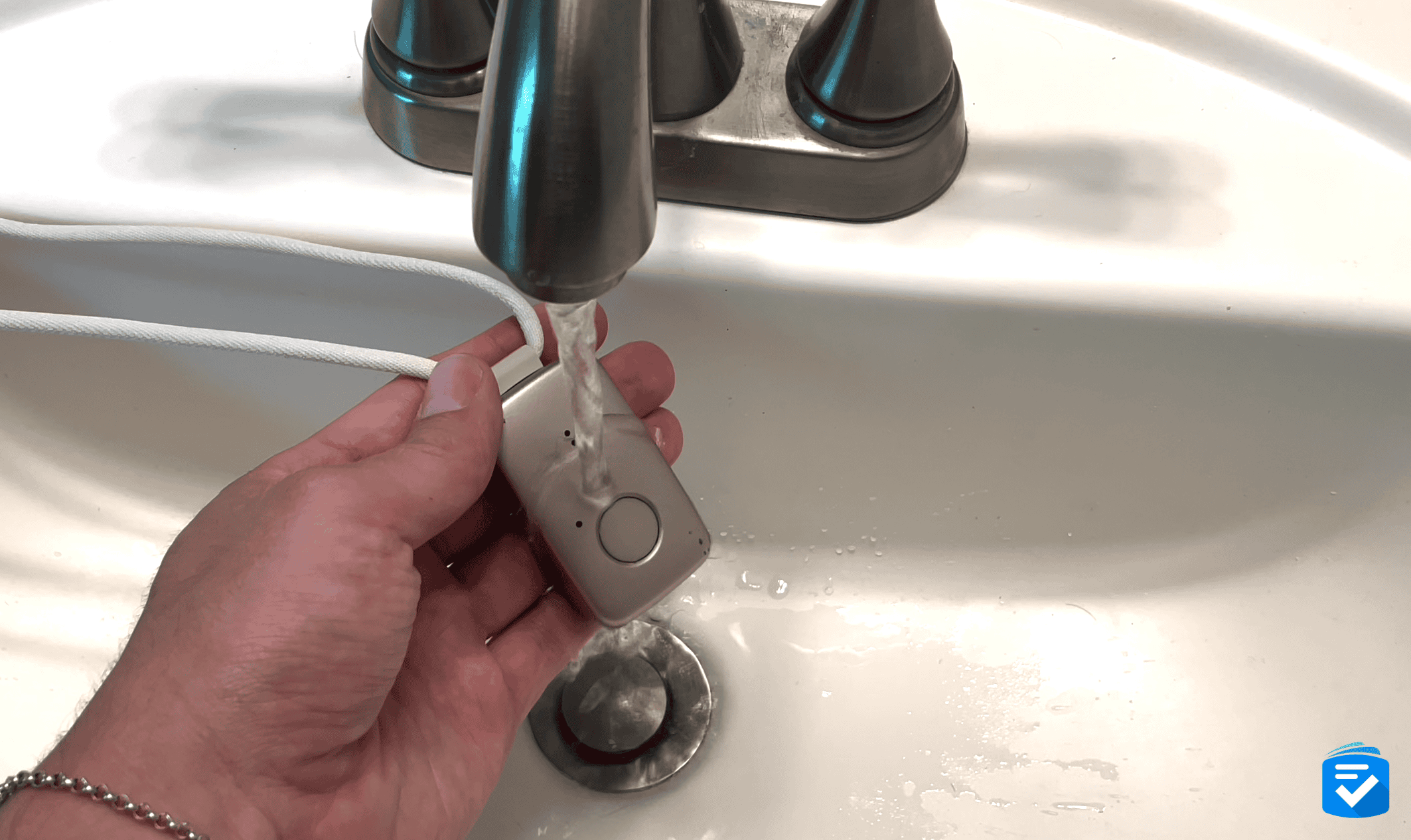
The fall detection was disappointing and the equipment was priced on the higher side. However, I’d still recommend the MGMini to active seniors who want a comfortable and unobtrusive medical alert system. It’s ideal if you want to use a device for days on end without charging.
However, it’s not a good option if you are seriously worried about falling and want a more dependable fall detection — despite the eight-second response time. It’s also not the cheapest option around, especially with the upfront equipment costs. For more information about other Medical Guardian devices, read my Medical Guardian reviews.


